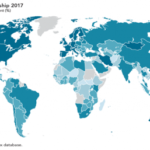I will be attending this meeting that start on Thursday and which finally take place after 9 months of work and 2 previous postponements. The meeting has been scaled down quite a bit as many of the initial speakers dropped out the list as they could not handle the ever changing agenda and dates. The meeting is now being directly organize by the Ministry of Foreign Affairs who is in the all around lead. UNDP is providing support but mostly on the logistical side.
In any event, KSA has been asking me for my recommendations which I finally sent this AM.
Here they are (unedited).
1. Being resource rich does not guarantee that KSA will automatically become a 21st century knowledge economy. On the contrary, empirical evidence seems to suggest an inverse correlation between the two.
2. To move ahead, KSA needs to develop national policies that directly tackle the issue and take the bull by the horns. Such policies in turn go beyond just developing an ICT sector or using ICTs all over the place. That is a necessary but not sufficient condition.
3. The integration of specific ICT and innovation policies into other key areas of national competitiveness is essential. It is important here to avoid a pure ICT approach as this can create a competing area among many others. Ideally, ICTs and innovation should also be brought into other development areas that KSA is supporting and will be supporting in the future.
4. In this light, KSA should strive to move from being a consumer of ICT and innovation to become a competitive producer of ICTs, innovation and global knowledge products. This not only requires a change in policies but also in mindsets.
5. Key here is capturing the imagination and ingenuity of young people who either already have the skills or are ready to learn then in the short and medium term. Creating a national human resource that can harness new ICTs, promote innovation and furnishes relevant knowledge products and services is vital here.
6. In addition, KSA should invest more heavily on national R&D, But this is link to the above as it will demand having the local capacities (PhDs and technical skills) that can drive and sustain such efforts effectively. While the two can be done in parallel and for example international mentoring and support systems can be used, the target of such policies and investments should be clear: we want to build a national ICT/innovation ecosystem that can drive KSA into a 21st knowledge economy.
7. Such ecosystem must also include the national private and academia in additional to government. This triangular ecosystem has proved to be effective in countries who today are leaders in innovation and are sound knowledge economies.
8. KSA can also use its current regional and global influence to support similar efforts in other countries by leading by example and fostering South South cooperation.
Cheers, Raúl





